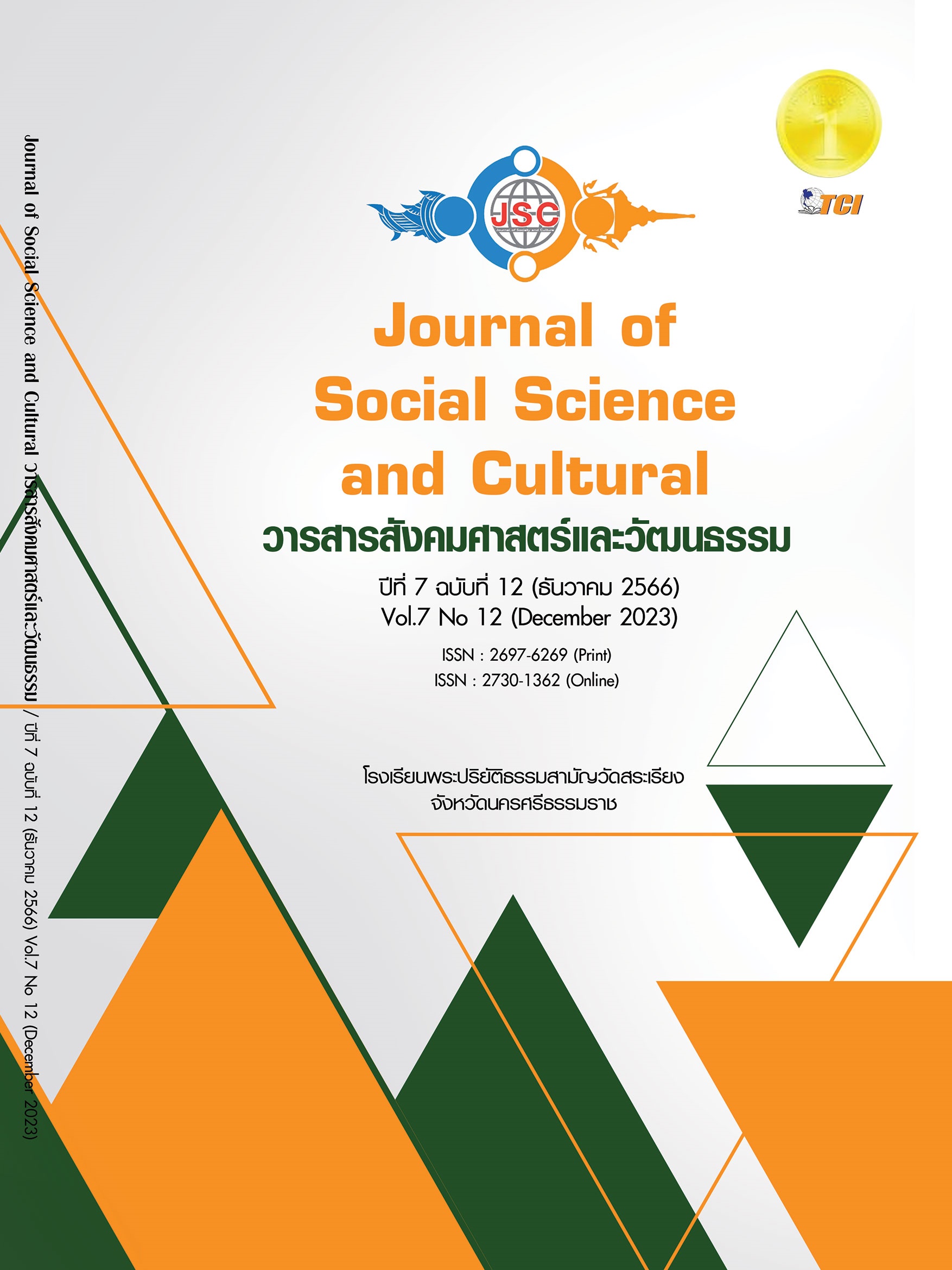GOVERNMENT MEASURES AND DEVELOPMENT OF CONDOMINIUM MARKETING MANAGEMENT MODELS IN BANGKOK AND SURROUNDING AREAS
Main Article Content
Abstract
The purposes of this research were 1) to study the general environment that affects condominium marketing management in Bangkok and its vicinity, 2) to study government measures that affect condominium marketing management in Bangkok and its vicinity and 3) to study the development of condominium marketing management model in Bangkok and its vicinity. The researcher chose to use a qualitative research methodology. by studying documents and in-depth interviews with 20 key informants and focus groups. Data were analyzed by separating content points and summarizing them. The results of the study revealed that 1) the general environment that affects condominium marketing management is 1.1) politics, real estate development policy; Build credibility, attractiveness 1.2) economy, increase investment opportunities in real estate and increasing demand for buying and selling condominiums 1.3) society and culture tends to lifestyle Utilization, behavior and values, needs change 1.4) Technology creates a communication system security system and modern building systems; and 1.5) business competition. Marketing changes on the online marketing system. Develop superior condominium quality Competing by price 2) Government measures that affect condominium marketing management are 2.1) Government measures for a million houses project increase strength credibility of the condominium business group 2.2) Government measures to reduce transfer-mortgage fees Help relieve the burden and expenses of buying housing. Increase demand for condominiums. 2.3) Condominium Act (No. 4) B.E. 2551, creating standards for condominium management including 2.4) Standards for fire prevention and suppression management B.E. 2555, resulting in credibility Trust in condominiums. 3) Guidelines for development of condominium marketing management are project development that is suitable for government measures. Bringing government measures to manage condominiums improve marketing plans that are in line with government measures. Use government measures to present and promote the condominium market. Delivering useful things in terms of information and offering special privileges from government measures. Use government measures to publicize condominium projects through the use of social media.
Article Details
References
ฉัตรชัย ศรีวิไล. (2565). ชง ครม.ขยายราคา 1.5 ล้าน ปรับเกณฑ์บ้านล้านหลังช่วยคนระดับกลาง. เรียกใช้เมื่อ 16 กุมภาพันธ์ 2566 จาก https://www.thairath.co.th/business/finance/2412371
ณัฎฐา คหาปนะ. (2565). ตลาดคอนโดปี 65 แนวโน้มฟื้นรับเจาะเปิดโครงการใหม่กลาง-ล่างหลังดึงต่างชาติร่วมทุน. เรียกใช้เมื่อ 10 ตุลาคม 2565 จาก https://www.infoquest.co.th/ 2022/210825
ธนกฤต ไทยมี. (2564). ปัญหากฎหมายการบริหารจัดการอาคารชุด. NITIPAT NIDA Law Journal, 10(1), 74-94.
ธนาคารแห่งประเทศไทย. (2564). ปรับเกณฑ์มาตรการ LTV เอื้อคนซื้อบ้านกรณีกู้ร่วม. เรียกใช้เมื่อ 17 กุมภาพันธ์ 2566 จาก https://shorturl.asia/WsqFp
รุ่งนภา พิมมะศรี. (2564). บ้านล้านหลัง’ โครงการกู้ดอกเบี้ยต่ำ โอกาสมีบ้านของคนรายได้น้อย-วัยเริ่มทำงาน. เรียกใช้เมื่อ 18 กุมภาพันธ์ 2566 จาก https://plus.thairath.co.th/ topic/money/100436
วิชชุลดา ศรีบุตร และคณะ. (2561). การบริหารจัดการสิ่งอำนวยความสะดวกของนิติบุคคลอาคารชุดในกรุงเทพและปริมณฑล. วารสารวิชาการ สถาบันวิทยาการจัดการแห่งแปซิฟิค (สาขามนุษยศาสตร์และสังคมศาสตร์), 4(2), 233-246.
ศูนย์วิจัยกสิกรไทย. (2566). ต่ออายุมาตรการลดค่าธรรมเนียมโอน-จดจำนอง...พยุงตลาดที่อยู่อาศัย. เรียกใช้เมื่อ 16 กุมภาพันธ์ 2566 จาก https://www.kasikornresearch.com/th/ analysis/k-social-media/Pages/Housing-FB-03-01-2023.aspx
สำนักงานประกันสังคม. (2565). สถิติผู้ประกันตนในเขตกรุงเทพมหานคร. เรียกใช้เมื่อ 24 กุมภาพันธ์ 2566 จาก https://opendata.nesdc.go.th/dataset/social-security-fund-statistics
สำนักส่งเสริมธุรกิจอสังหาริมทรัพย์. (2564). การควบคุมการดำเนินการของอาคารชุด. เรียกใช้เมื่อ 10 ตุลาคม 2565 จาก https://www.dol.go.th/estate/Pages/default.aspx
Abdoh, H. M. B et al. . (2020). The effect of PESTLE factors on E-government adoption in Jordan: A conceptual model. IJETT, 68(2020), 19-23.
Audretsch, D. B. et al. (2019). National business regulations and city entrepreneurship in Europe: A multilevel nested analysis. Entrepreneurship theory and practice, 43(6), 1148-1165.
Braun, V., & Clarke, V. (2021). One size fits all? What counts as quality practice in (reflexive) thematic analysis? Qualitative research in psychology, 18(3), 328-352.
Chege, S. M. et al. (2020). Impact of information technology innovation on firm performance in Kenya. Information Technology for Development, 26(2), 316-345.
Desai, V., & Vidyapeeth, B. (2019). Digital marketing: A review. International Journal of Trend in Scientific Research and Development, 5(5), 196-200.
Galbreath, J. et al. (2020). Entrepreneurial orientation and firm performance in Italian firms: The moderating role of competitive strategy. International Journal of Entrepreneurial Behavior & Research, 26(4), 629-646.
Gasparin, M. et al. (2021). Business as unusual: A business model for social innovation. Journal of Business Research, 125(2021), 698-709.
Haseeb, M. et al. (2019). Role of social and technological challenges in achieving a sustainable competitive advantage and sustainable business performance. Sustainability, 11(14), 38-11.
Hengst, I. A. et al. (2020). Toward a process theory of making sustainability strategies legitimate in action. Academy of Management Journal, 63(1), 246-271.
Inrawan, A. et al. (2022). SWOT Analysis as a Basis for Tracking Business Opportunities in the City of Pematangsiantar. KnE Social Sciences, 2022(2022), 441-455.
Jafari-Sadeghi, V. et al. (2021). Exploring the impact of digital transformation on technology entrepreneurship and technological market expansion: The role of technology readiness, exploration and exploitation. Journal of Business Research, 124(2021), 100-111.
Komsan Tunsakul. (2019). Digital marketing (in Thai). Bangkok: BU Press.
Meire, M. et al. (2019). The role of marketer-generated content in customer engagement marketing. Journal of Marketing, 83(6), 21-42.
Mezmir, E. A. (2020). Qualitative data analysis: An overview of data reduction, data display, and interpretation. Research on humanities and social sciences, 10(21), 15-27.
Mihoko, M. et al. (2020). Impact of gentrification on travel behavior in transit-oriented. Case Studies on Transport Policy, 8(4), 1341-1351.
Nguyen, N. P., & Adomako, S. (2021). Environmental proactivity, competitive strategy, and market performance: The mediating role of environmental reputation. Business Strategy and the Environment, 30(4), 2008-2020.
Pan, W. et al. (2019). PESTEL analysis of construction productivity enhancement strategies: A case study of three economies. Journal of Management in Engineering, 35(1), 05018013.
Peiris, S., & De Silva, N. (2020). Business Continuity Planning for Condominium Managing Agents in Sri Lanka: Resilience during Pandemics. International Journal of Real Estate Studies, 14(S1), 17-30.
Rocha, M. S. R., & Caldeira-Pires, A. (2019). Environmental product declaration promotion in Brazil: SWOT analysis and strategies. Journal of Cleaner Production, 235(2019), 1061-1072.
TI, E. S. W. (2019). Politics and policy: Chinese money and its impact on the regulation of residential property in the west. Conveyancer and Property Lawyer, 83(3), 371.
Udriyah, U. et al. (2019). The effects of market orientation and innovation on competitive advantage and business performance of textile SMEs. Management Science Letters, 9(9), 1419-1428.


